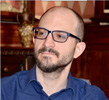Studying at the University of Verona
Here you can find information on the organisational aspects of the Programme, lecture timetables, learning activities and useful contact details for your time at the University, from enrolment to graduation.
Academic calendar
The academic calendar shows the deadlines and scheduled events that are relevant to students, teaching and technical-administrative staff of the University. Public holidays and University closures are also indicated. The academic year normally begins on 1 October each year and ends on 30 September of the following year.
Course calendar
The Academic Calendar sets out the degree programme lecture and exam timetables, as well as the relevant university closure dates..
| Period | From | To |
|---|---|---|
| Sem. IA | Sep 25, 2017 | Nov 11, 2017 |
| Sem. IB | Nov 13, 2017 | Jan 20, 2018 |
| Sem. IIA | Feb 26, 2018 | Apr 21, 2018 |
| Sem. IIB | Apr 23, 2018 | Jun 9, 2018 |
| Session | From | To |
|---|---|---|
| Sessione Invernale | Jan 22, 2018 | Feb 24, 2018 |
| Sessione Estiva | Jun 11, 2018 | Jul 28, 2018 |
| Sessione Autunnale | Aug 27, 2018 | Sep 22, 2018 |
| Sessione Straordinaria | Jan 14, 2019 | Feb 16, 2019 |
| Session | From | To |
|---|---|---|
| Sessione Estiva | Jul 16, 2018 | Jul 21, 2018 |
| Sessione Autunnale | Nov 12, 2018 | Nov 17, 2018 |
| Sessione Primaverile | Apr 1, 2019 | Apr 6, 2019 |
| Period | From | To |
|---|---|---|
| All Saints Day | Nov 1, 2017 | Nov 1, 2017 |
| Immaculate Conception | Dec 8, 2017 | Dec 8, 2017 |
| Christmas break | Dec 22, 2017 | Jan 7, 2018 |
| Easter break | Mar 30, 2018 | Apr 3, 2018 |
| Liberation Day | Apr 25, 2018 | Apr 25, 2018 |
| Labour Day | May 1, 2018 | May 1, 2018 |
| Patron Saint Day | May 21, 2018 | May 21, 2018 |
| Republic Day | Jun 2, 2018 | Jun 2, 2018 |
| Summer break | Aug 13, 2018 | Aug 18, 2018 |
Exam calendar
Exam dates and rounds are managed by the relevant Humanistic Studies Teaching and Student Services Unit.
To view all the exam sessions available, please use the Exam dashboard on ESSE3.
If you forgot your login details or have problems logging in, please contact the relevant IT HelpDesk, or check the login details recovery web page.
Should you have any doubts or questions, please check the Enrollment FAQs
Academic staff
 cristina.bertazzoni@univr.it
cristina.bertazzoni@univr.it
 donato.desilvestri@univr.it
donato.desilvestri@univr.it

Longo Mario
 mario.longo@univr.it
mario.longo@univr.it
 045 8028393
045 8028393
 federico.melotto@univr.it; federicomelotto@hotmail.com
federico.melotto@univr.it; federicomelotto@hotmail.com

Migliorati Lorenzo
 lorenzo.migliorati@univr.it
lorenzo.migliorati@univr.it
 045802 8135
045802 8135
 andrea.nicolini.uni@gmail.com - andrea.nicolini@univr.it
andrea.nicolini.uni@gmail.com - andrea.nicolini@univr.it
 igor.pelgreffi@univr.it
igor.pelgreffi@univr.it
 stefania.pontrandolfo@univr.it
stefania.pontrandolfo@univr.it
 pieralberto.porcedducilione@univr.it; pierre_pordd@yahoo.it
pieralberto.porcedducilione@univr.it; pierre_pordd@yahoo.it
 045 8028732
045 8028732
Study Plan
The Study Plan includes all modules, teaching and learning activities that each student will need to undertake during their time at the University.
Please select your Study Plan based on your enrollment year.
1° Year
| Modules | Credits | TAF | SSD |
|---|
2° Year activated in the A.Y. 2018/2019
| Modules | Credits | TAF | SSD |
|---|
3° Year activated in the A.Y. 2019/2020
| Modules | Credits | TAF | SSD |
|---|
| Modules | Credits | TAF | SSD |
|---|
| Modules | Credits | TAF | SSD |
|---|
| Modules | Credits | TAF | SSD |
|---|
| Modules | Credits | TAF | SSD |
|---|
Legend | Type of training activity (TTA)
TAF (Type of Educational Activity) All courses and activities are classified into different types of educational activities, indicated by a letter.
Sociology and analysis of social dynamics (2017/2018)
Teaching code
4S02401
Teacher
Coordinator
Credits
9
Language
Italian
Scientific Disciplinary Sector (SSD)
SPS/07 - GENERAL SOCIOLOGY
Period
Sem. IA, Sem. IB
Learning outcomes
The aims of the course are:
- to present the main concepts of sociology, paying special attention to strategies and main subjects of sociological research and referring particularly to Italian society features;
- to present a systematic introduction to techniques of structural analysis, known also well as techniques of social network analysis, first presenting their theoretical roots and secondly dealing with the relational concept of social phenomena;
- to examine two subjects particularly relevant in education: amoral familism, and school social capital. These concepts will be presented through the analysis of some empirical researches, that show operational strategies for the practical use of the social network analysis.
At the end of the taught course, students must be able to:
(i) define the most important concepts and issues for sociology with special reference to those regarding the fields of action of the educational services;
(ii) use the acquired theoretical approaches to read social phenomena and be able to effectively define the most important characteristics of relational contexts, namely social networks;
(iii) use their acquired abilities to make autonomous use of data regarding social contexts and analyse the characteristics of social networks, in particular in the educational field;
(iv) describe their own objects of theoretical attention with proficiency, methodological precision and command of terminology;
(v) use the acquired abilities, in terms of strategies for analysis and obtaining information, to confidently study the social aspect of educational phenomena.
Program
To achieve the learning outcomes, the course will take shape over the following three-part syllabus:
First part:
1. Introduction to sociology;
2. Culture;
3. Social structure;
4. Socialization;
5. Social interaction;
6. Organizations;
7. Deviance and social control;
8. Community and urban life;
9. Inequality, stratification and social classes;
10. Ethnic inequality;
11. Gender and inequality;
12. Age and inequality;
13. Family;
14. Education;
15. Religion;
16. Economy and society;
17. Political system;
18. Population dynamics;
19. Collective behaviour and social movements;
20. Social and cultural change.
Second part:
1. Definition and utility of social network analysis;
2. Theoretical roots of social network analysis;
3. Social relation and its operationalization;
4. Methods for the data collection and organization;
5. Graphic representation of data;
6. Graph Theory;
7. Matrix representation of data;
8. Centrality and centralization of graphs;
9. Methods and techniques for partition of graphs;
10. Methods for reduction of graphs;
11. Positions, roles and structural equivalence;
12. Limits and prospects of development for social network analysis.
Third part:
1. The relational paradigms of social research: relational sociology, and social network analysis;
2. The joint use of the research methodologies;
3. The relational analysis of amoral familism;
4. The relational analysis of school social capital.
The syllabus will be presented analytically in frontal lectures. All topics in the syllabus can be found in the following reference books:
1) For the first part of the syllabus: N.J. Smelser, Manuale di sociologia, Bologna, il Mulino, 2011 (all).
2) For the second part of the syllabus: A.M. Chiesi, L’analisi dei reticoli, Milano, FrancoAngeli, 1999 (except the Appendix).
3) For the third part of the syllabus: L. Tronca, Sociologia relazionale e social network analysis. Analisi delle strutture sociali, Milano, FrancoAngeli, 2013 (all).
| Author | Title | Publishing house | Year | ISBN | Notes |
|---|---|---|---|---|---|
| Antonio M. Chiesi | L’analisi dei reticoli (Edizione 1) | FrancoAngeli | 1999 | 9788846418005 | Esclusa l'Appendice. / Except the Appendix. |
| Neil J. Smelser | Manuale di sociologia (Edizione 5) | il Mulino | 2011 | 9788815232502 | Tutto il testo. / All. |
| Luigi Tronca | Sociologia relazionale e social network analysis. Analisi delle strutture sociali (Edizione 1) | FrancoAngeli | 2013 | 9788820420574 | Tutto il testo. / All. |
Examination Methods
The examination aims to check the skills acquired by students. The content of the syllabus will be assessed. The examination consists of a written test with thirty-one multiple-choice questions potentially concerning any of the syllabus content. A mark will be given out of thirty. The examination is conducted in the same way for attending and non-attending students.
Type D and Type F activities
Modules not yet included
Career prospects
Module/Programme news
News for students
There you will find information, resources and services useful during your time at the University (Student’s exam record, your study plan on ESSE3, Distance Learning courses, university email account, office forms, administrative procedures, etc.). You can log into MyUnivr with your GIA login details: only in this way will you be able to receive notification of all the notices from your teachers and your secretariat via email and soon also via the Univr app.
Graduation
Documents
| Title | Info File |
|---|---|
|
|
pdf, it, 99 KB, 13/10/23 |
|
|
pdf, it, 101 KB, 10/04/24 |
List of theses and work experience proposals
| theses proposals | Research area |
|---|---|
| Ambienti e contesti di lavoro con minori | Various topics |
| Analisi dei personal network di sostegno | Various topics |
| comunicazioni relative alla tesi | Various topics |
| Il teatro come contesto educativo | Various topics |
| I processi di globalizzazione culturale nella società contemporanea | Various topics |
| La social network analysis applicata allo studio dei contesti educativi | Various topics |
| L'educatore ed i progetti europei | Various topics |
| L'impegno associativo in ambito educativo | Various topics |
| Politiche sociali e contesti educativi | Various topics |
| Progetti di collaborazione con le istituzioni scolastiche | Various topics |
| PROPOSTE TESI AMBITO GEOGRAFICO | Various topics |
| Scuola e capitale sociale | Various topics |
Linguistic training CLA
Gestione carriere
Student mentoring
Practical information for students
Documents
| Title | Info File |
|---|---|
|
|
pdf, it, 325 KB, 02/05/23 |
|
|
pdf, it, 212 KB, 02/05/23 |
|
|
pdf, it, 131 KB, 02/05/23 |
Stage e Tirocini
Le ulteriori attività formative (crediti F) sono interamente coperte dall’attività di tirocinio “indiretto” (1 cfu) da svolgersi nel secondo anno e di tirocinio “diretto” (14 cfu) da svolgersi presso enti convenzionati per un numero complessivo di 15 cfu (375 ore). Chi è iscritta/o al curriculum servizi per l’infanzia è tenuta/o a svolgere il tirocinio presso nidi e servizi per la prima infanzia per almeno il 50% delle ore.
Il tirocinio professionalizzante (375 ore, pari a 15 cfu), è obbligatorio sia nella sua forma diretta che indiretta.
Il tirocinio indiretto, della durata di 25 ore a frequenza obbligatoria al 75%, si svolge in Università per 20 ore e in forma di lavoro individuale per 5 ore e consiste in un accompagnamento iniziale delle/degli studenti da parte dei tutor attraverso un percorso formativo dotandoli di conoscenze e strumenti adeguati a osservare, comprendere e rielaborare criticamente l’esperienza di tirocinio nei servizi educativi e ad affrontare il tirocinio negli enti con metodo e consapevolezza. Il percorso, da attuare in gruppi da 20-25 persone sotto la supervisione di un tutor, risponde alle esigenze costantemente espresse sia dalle/dagli studenti stessi sia dalle parti sociali che dai referenti degli enti convenzionati.
Il tirocinio diretto si propone di raggiungere i seguenti obiettivi:
- fare esperienza diretta di attività professionali, che richiedono un livello di preparazione al lavoro educativo;
- approfondire in particolare il rapporto tra preparazione teorica, acquisita mediante lo studio, ed esperienza pratica, tra mondo del sapere e della cultura e mondo del lavoro e delle professioni;
Al termine del tirocinio diretto lo studente deve presentare una relazione scritta, nella modalità concordata con il tutor accademico.
Nuove Linee Guida per il tirocinio di Scienze dell'educazione.
- Tutte le informazioni in merito agli stage per futuri studenti sono disponibili alla pagina Stage e tirocini.
- Tutte le informazioni in merito agli stage per studenti iscritti sono pubblicate in MyUnivr - come fare per - stage e tirocini.
- Tutte le informazioni in merito agli stage per le aziende sono disponili alla pagina Stage e tirocini per azienze.
Documents
| Title | Info File |
|---|---|
|
|
pdf, it, 302 KB, 16/07/21 |























